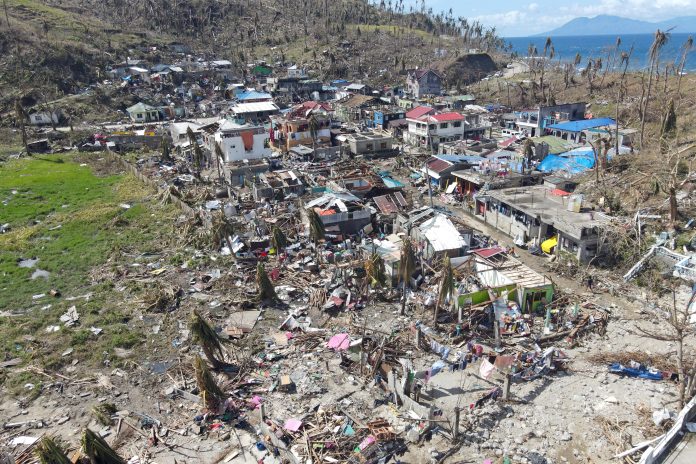I’ve seen a big hurricane before. Typhoon Nitang in 1984. People have learned what happens when we’re hit by a hurricane that’s extremely strong. Our neighbors, they ended up in the mangroves. And there were others in the fishpond, dead. We really hoped Odette (international name: Rai) would not be a repeat of Nitang.
I thought we were all going to die. Very strong winds, and the waves were just so huge. But we all helped each other.
As early as three days before the storm, the barangay captain and I went from house to house, telling people to evacuate. Some people didn’t want to leave their homes, their livelihood, and their animals. We really tried to persuade them to go to the evacuation center. We really hoped we wouldn’t lose a single person in our village.
I was really scared because I saw the wind coming in at the evacuation center. Then there was another gust of wind, and it was as if they were clashing. It was like the winds would pick up the building we were in. We got a rope and tied it to the building, so everyone could hold on.
Everyone was crying and some people said, someone was missing. So we went out to rescue them. We were soaking wet. Some people, tree branches fell on them, but we helped each other. There was a woman who looked like she was about to give birth. We were scared because we don’t know how to help with childbirth.
The flood, the seawater, it must have been three meters high at the evacuation center. I said Lord, please have mercy, please save us. Never mind if we lose everything as long as not one of us dies. I’m so grateful because no one died. But I really cried because one of my children got separated from me. I thought if we’re going to die, then we will die together, all of us.
The next day when I looked around the village, it was like a ghost town. Everything has fallen apart, especially our health center and our school, as if the storm carried it away. Not one piece of the roof was left, even the walls, nothing is left.
Here in Sugbay, we have 172 families. We’re farmers. We plant cassava, coconut. But now, the coconut trees won’t grow. How will the farmers survive? They have to start from nothing. Coconut trees have to grow 10 years before you can harvest. We have to count ten years again before we can harvest anything.
Some, like my husband, live off the sea. How can we live if we don’t have boats? We lost our nets, our fish cages. We couldn’t save anything. We have nothing we can use at sea. The loan on the boat isn’t paid off yet. Now I don’t know how we’re going to pay. If we could have even just one boat and nets it would be a big help.
I am thankful, despite everything that happened, because some help came in: rice, canned food, hygiene kits.
We need help to repair our facilities especially the health center and our bridge.
No one died here, thank God. Nobody was lost, nobody even got sick, among everyone who evacuated.
Our elderly neighbors, I feel really sorry for them. Just today, an elderly woman fell on the road, because it was too slippery. This happens when it’s always raining.
But we can still cope, even with all the difficulty. We can’t lose hope.
Queencel Catulay is a farmer from Barangay Sugbay, in Surigao City. Survivors and Doctors Without Borders / Médecins Sans Frontières (MSF) facilitated the sharing of stories about the impact of typhoon Odette (international name Rai) that hit the country in December and badly affected some areas in the Philippines.









